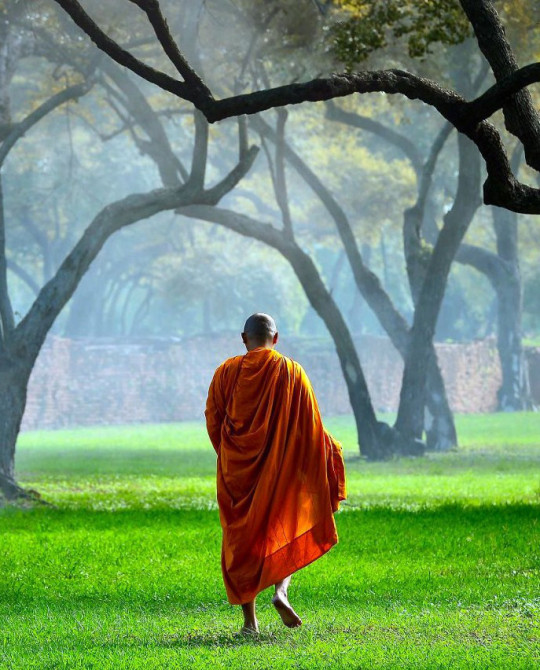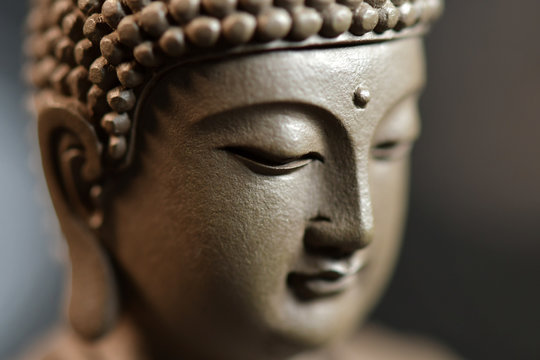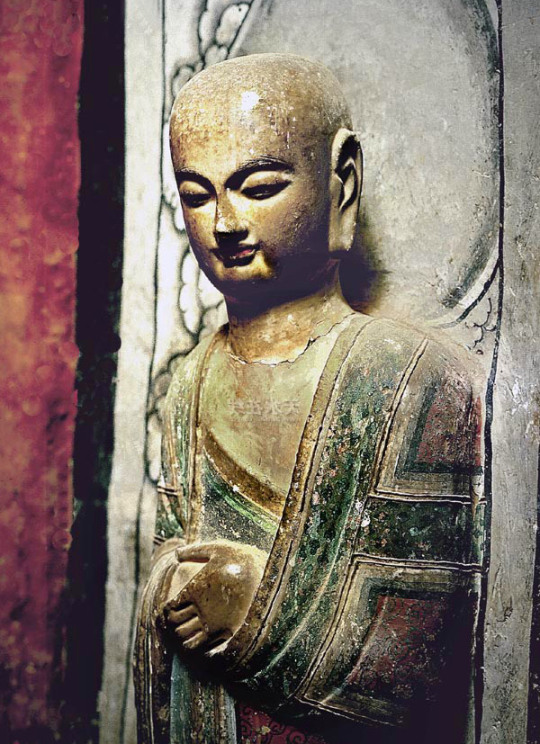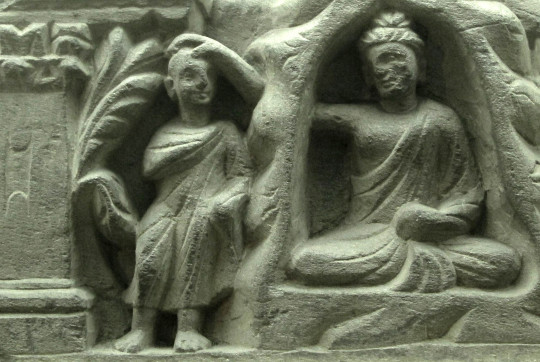#Purna Maitrayiputra
Photo

The Quest for Buddhism (53)
Punnovada Sutta – Buddha's teaching to his No.5 disciple, Purna (Pali: Punna)
The Punnovada Sutta is the 145th discourse of the Majjhimanikāya.
On one occasion, Buddha was staying at the Anathapindika (Jetavana) in Sāvatthi (Skt. Shravasti). Bhikku Punna (Skt.Purna :Ref) visited him there and asked him about the art of devotion in seclusion that he may follow it and be purged of self. The Buddha tells him to avoid finding delight in the pleasures of the senses.
The Buddha's teaching on the Buddha Dharma to the Bhikkhu Punna. Reveals that suffering is caused by 'joyous pleasure' arising from stimuli entering from the six places.
The Buddha explains the control of the Six Ayatana (the six internal-external organs of sense):
Six roots - the six organs or senses on the side of subjectivity:
Eye - visual ability or the organ of sight.
Ear - the ability to hear or the organ of hearing.
Nose - olfactory abilities or olfactory organs.
Tongue - the ability to taste or the organ of taste
Body - Tactile abilities or sense of touch
Will - Perceptive abilities or organs of perception
Six borders - the six objects on the objective side, the objects of the senses:
Colour - the colours and forms seen by the eye root.
Voice - objects of hearing.
Aroma - object of the sense of smell.
Taste - object of the sense of taste.
Touch - firmness, heat, heaviness, etc. perceived by the roots of the body.
Dharma - all existence, including concepts, perceived by the mind-root.

仏教の探求 (53)
プンナ教誡経 (プンナきょうかいきょう、巴: プンノーヴァーダ・スッタ)〜ブッダが5番弟子のプールナ(富楼那、巴:プンナ)に説いた仏法
プンナ教誡経とは、マッジマニカーヤ(中部)の145番目の講話ことである。
ある時、ブッダはサーヴァッティー(舎衛城)のアナータピンディカ園(祇園精舎)に滞在していた。そこに比丘プンナ (富楼那、プールナ:参照)がブッダのもとを訪れ、、人里離れて精進していく術を問う。それに従って自己を浄化するようにと頼む。ブッダは、六感の楽しみを見出さないようにと言う。
ブッダが、比丘プンナ(富楼那)に六処の制御を説く。六処より入る刺激に基づいて生起する「喜悦」によって、苦が発生することを明らかにする。六処(しょ、梵・巴: アーヤタナ)とは、感覚器、感覚媒体、感覚範囲を意味する。仏教では、6つの内部感覚器六根(ろっこんと、6つの外部感覚器六境(ろっきょう)に分類される:
六根(ろっこん、六内入処(ろくないにゅうしょ)とも) - 主観の側の六種の器官、感官のこと:
眼(げん) - 視覚能力もしくは視覚器官
耳(に) - 聴覚能力もしくは聴覚器官
鼻(び) - 嗅覚能力もしくは嗅覚器官
舌(ぜつ) - 味覚能力もしくは味覚器官
身(しん) - 触覚能力もしくは触覚器官
意(い) - 知覚能力もしくは知覚器官
六境(ろっきょう、六外入処(ろくげにゅうしょ)とも) - 客観の側の六種の対象、感官の対象のこと:
色(しき) - 眼根によって見られる色彩と形象
声(しょう) - 聴覚の対象
香(こう) - 嗅覚の対象
味(み) - 味覚の対象
触(そく) - 身根によって感じられる堅さ、熱さ、重さなど
法(ほう) - 意根によって知覚される概念を含むすべての存在
#Punnovada Sutta#Majjhimanikāya#pali cannon#buddha#buddhism#punna#Purna Maitrayiputra#buddha's teaching#buddha's disciple#ayatana#the six internal-externa organs of sense#body and mind#buddha dharma#history#nature#art
103 notes
·
View notes
Photo

The Quest for Buddhism (54)
Punnovada Sutta – Buddha's teaching to his No.5 disciple, Purna (Pali: Punna) -Part 2 [Part1]
The Punnovada Sutta is the 145th discourse of the Majjhimanikāya.
Bhikku Punna (Skt.Purna :Ref) visited the Buddha and asked him about the art of devotion in seclusion that he may follow it and be purged of self. The Buddha explains the control of the Six Ayatana (the six internal-externa organs of sense):
The Buddh said.
O Punna, there are various colours (rupas) which are perceived by the eye, which are desirable, agreeable, pleasing, lovable in aspect, which arouse desire and attract the mind. If Bhikkhu, delighted and attached to them, stays, joy arises in him who is delighted and attached to them.
O Punna, I teach, 'There is more arising of suffering than arising of joyousness'
O Punna, which is perceived by the ear, ... (omitted)... There are various voices. If Bhikkhu rejoices in them ... (omitted)... Joyousness arises. O Punna, I teach that 'from the arising of joy there is the arising of suffering'.
O Punna, by the nose is perceived, ... (omitted)... There are various fragrances. If Bhikkhus rejoice in them, ... (omitted)... Joyousness arises. O Punna, I teach that 'from the arising of joy there is the arising of suffering'.
O Punna, which is perceived by the tongue, ... (omitted)... There are various tastes. If Bhikkhu rejoices in them ... (omitted)... Joyousness arises. O Punna, I tell you that there is more arising of suffering than arising of joy.
O Punna, being perceived by the body, ... (omitted)... There are various kinds of touch. If Bhikkhus rejoice in them ... (omitted)... Joyousness arises. O Punna, I teach that 'from the arising of joy there is the arising of suffering'.
O Punna, being aware by the will, ... (omitted)... There are various Dharmas. If Bhikkhus rejoice in them ... (omitted)... Joyousness arises. O Punna, I teach that 'from the arising of joy there is the arising of suffering'.
Moreover, O Punna, there are various colours which are perceived by the eye, which are desirable, agreeable, pleasing, lovable in aspect, which arouse desire and attract the mind.If Bhikkhu does not delight in them and remains unattached to them, then joyousness perishes in him who does not delight in them and is unattached to them.
O Punna, I teach that 'by the extinction of joyousness there is the extinction of suffering'.
O Punna, by the ear you can perceive, ... (omitted)... There are various voices. If Bhikkhu does not rejoice in them ... (omitted below)...

仏教の探求 (54)
プンナ教誡経 (プンナきょうかいきょう、巴: プンノーヴァーダ・スッタ)〜ブッダが5番弟子のプールナ(富楼那、巴:プンナ)に説いた仏法・その2(その1)
プンナ教誡経とは、マッジマニカーヤ(中部)の145番目の講話ことである。
比丘プンナ (富楼那、プールナ:参照)がブッダのもとを訪れ、人里離れて精進していく術を問う。ブッダが、比丘プンナ(富楼那)に六処の制御を説く:
世尊は言った。
プンナよ、眼によって識られる、望ましく、好ましく、喜ぶべく、愛すべき形相で、欲をかきたて、心をひきつける諸々の色(ルーパ)がある。もし比丘が、それを歓喜し執着してとどまるならば、それを歓喜し執着する彼に、喜悦が起こる。
プンナよ、「喜悦の生起より苦の生起がある」と私は説く。
プンナよ、耳によって識られる、...(中略)...諸々の声がある。もし比丘が、それを歓喜し...(中略)...喜悦が起こる。プンナよ、「喜悦の生起より苦の生起がある」と私は説く。
プンナよ、鼻によって識られる、...(中略)...諸々の香がある。もし比丘が、それを歓喜し...(中略)...喜悦が起こる。プンナよ、「喜悦の生起より苦の生起がある」と私は説く。
プンナよ、舌によって識られる、...(中略)...諸々の味がある。もし比丘が、それを歓喜し...(中略)...喜悦が起こる。プンナよ、「喜悦の生起より苦の生起がある」と私は説く。
プンナよ、身によって識られる、...(中略)...諸々の触がある。もし比丘が、それを歓喜し...(中略)...喜悦が起こる。プンナよ、「喜悦の生起より苦の生起がある」と私は説く。
プンナよ、意によって識られる、...(中略)...諸々の法がある。もし比丘が、それを歓喜し...(中略)...喜悦が起こる。プンナよ、「喜悦の生起より苦の生起がある」と私は説く。
プンナよ、意によって識られる、...(中略)...諸々の法がある。もし比丘が、それを歓喜し...(中略)...喜悦が起こる。プンナよ、「喜悦の生起より苦の生起がある」と私は説く。
また、プンナよ、眼によって識られる、望ましく、好ましく、喜ぶべく、愛すべき形相で、欲をかきたて、心をひきつける諸々の色がある。もし比丘が、それを歓喜せず、執着せずにとどまるならば、それを歓喜せず執着しない彼に、喜悦が滅する。
プンナよ、「喜悦の滅尽により苦の滅尽がある」と私は説く。
プンナよ、耳によって識られる、...(中略)...諸々の声がある。もし比丘が、それを歓喜せず、執着せずにとどまるならば、それを歓喜せず執着しない彼に、喜悦が滅する...(以下省略)...
#buddha#buddha dharma#punnovada sutta#Purna Maitrayiputra#punna#buddha's disciple#buddhism#wheel law#wheel buddhism#wisdom#philosophy#history#nature#art
102 notes
·
View notes
Photo

The Quest for Buddhism (55)
Punnovada Sutta – Buddha's teaching to his No.5 disciple, Purna (Pali: Punna) -Part 3
The Punnovada Sutta is the 145th discourse of the Majjhimanikāya.
Below is the conclusion of the Buddha's discourse to Bhikku Punna (Skt.Purna :Ref) [So Far]:
The Buddha then asks Punna which region he is going to go, and Punna replies that it is Sunaparanta, where there are many rough people. The Buddha told Punna that if the people of that region ;
If they curse him,
If they hit him,
If they hit him with a lump of earth,
If they hit him with a sword,
If they kill him with a sword, he asked what he would do.
Punna answered the buddha, “O Lord, when I am humiliated and abused, I shall think as the people of Sunaparanta are wise and very good people. They may have cursed me, but they never threw stones at me,
If I am stoned by them, I shall assume they would not have cut me with a sword or hit me with a stick,
I shall assume that they did not kill me, even though they cut me with swords and beat me with sticks,
If I am killed, O Lord, I shall think thus. The people of Sunaparanta are wise and very good. That they took my decaying body and life and liberated me.”
When Punna replied that he was unaffected by all of them, the Buddha praised him for his overcoming spirit and sent him on his way. Punna was active in the land, leading many to Buddhism, and he also attained the Abhijñā (6 Divine Powers: Ref2) and became an arhat, later entering nirvana.

仏教の探求 (55)
プンナ教誡経 (プンナきょうかいきょう、巴: プンノーヴァーダ・スッタ)〜ブッダが5番弟子のプールナ(富楼那、巴:プンナ)に説いた仏法・その3
プンナ教誡経とは、マッジマニカーヤ(中部)の145番目の講話ことである。
以下、比丘プンナ (富楼那、プールナ:参照)へのブッダの講話の結末 (これまでのお話):
続いて、ブッダがプンナにこれからどの地方に赴くのか聞くと、プンナは粗暴者が多いスナーパランタであると答える。ブッダがプンナに、もしその地方の者たちがプンナを;
罵ったら、
殴ったら、
土塊で殴ったら、
剣で殴ったら、
剣で殺したら、彼はどうするか訊ねた。
比丘プンナはそれに答えて言った;世尊よ、辱められ罵られたら私はこう思うことにいたしましょう。スナーパランタの人々は賢くて、とてもよい人たちだ。私を罵っても、石を投げつけることはしなかったと、
石を投げつけられても、彼らは刀で切りつけたり、棒で殴りかかってきたりはしなかったと、
刀で切りつけられ棒で殴られても、彼らは私を殺しはしなかったと思うことにいたしましょう、
世尊よ、もし私が殺されたならば、こう思うことにいたしましょう。かのスナーパランタの人々は賢くて、とてもよい人たちだ。朽ち果てた私の身体と生命を奪い、解脱させてくれたと」
プンナがその全てに動じない回答をすると、釈迦はその克己ぶりを讃えて送り出す。プンナはその土地で活躍し、多くの者を仏道へと導き、また六神通(参照2)を得て阿羅漢となり、後に入滅(般涅槃)する。
#buddha#buddhism#buddha dharma#punnovada sutta#majjhimanikāya#Purna Maitrayiputra#punna#abhijñā#six divine powers#nirvana#history#nature#art
88 notes
·
View notes
Photo

The Quest for Buddhism (34)
The family of Siddhartha (Buddha)
Ananda - Cousin, the primary attendant and one of the Ten Principal Disciples
Ananda was one of the ten great disciples of the Buddha and was known as the Treasurer of the Dhamma (the one who heard the most) because, as the Buddha's primary attendant, he was always close by to hear his teachings. He is known for his memory, erudition and compassion, and is often praised by the Buddha for these matters. He functions as a foil to the Buddha, however, in that he still has worldly attachments and is not yet attained the Abhijna (the six divine powers: Ref), as opposed to the Buddha.
Ananda was born on the night of the Buddha's attainment. When his father, King Dronodhana, sent a messenger to King Suddhodana (Ref2), the father of Buddha, to inform him of Ananda's birth, King Suddhodana was extremely happy and all the country rejoiced at the birth of the prince, and was named 'Ananda (Bliss)'.
He is generally said to be a cousin of Buddha, and the younger brother of Devadatta (Ref3) who is depicted in various Buddhist scriptures as an evil person who defied the Buddha and his teachings.
When Buddha was 55 years old and Ananda was 25, he too, together with Anuruddha and other princes, went to Buddha and became a disciple of the Buddha.
According to the Chinese Buddhacarita Sangraha (Lalitavistara Sūtra, Buddha's biography translated by Jnanagupta of the Sui Dynasty), Ananda and Devadatta did not obtain permission from the Buddha, when they were ordained.
Two brothers were ordained by the elder Purna Maitrayiputra at the foot of Snow Mountain in the Himalayas, received the Gusoku precepts (to be observed by ordained practitioners in Buddhism), and with the master's permission became Buddha's disciples.
After the ordination, Ananda became the attendant of the Buddha, when the Buddha selected him for this task. Ananda performed his duties with great devotion and care, and acted as an intermediary between the Buddha and the laypeople, as well as the sangha (Sanskrit: samgha, lit. 'monastic community'). He accompanied the Buddha for the rest of his life, acting not only as an assistant, but also a secretary and a mouthpiece.

仏教の探求 (34)
お釈迦さまの家族
阿難 (あなん、梵/巴:アーナンダ・阿難陀)〜従弟、重要な侍者そして十大弟子の一人
アーナンダは、釈迦の十大弟子の一人で、釈迦の主従として、いつも近くで教えを聞いていたことから、多聞第一(たもんだいいち)と呼ばれるようになった。彼は記憶力、博識、慈悲深さで知られ、しばしばブッダにこれらの点を褒め称えられる。しかし、彼はまだ世俗的な執着を持ち、ブッダとは対照的にまだ六神通(ろくじんずう、梵:アビジュニャー・参照)を開いていない点で、ブッダの箔付けとして機能している。
アーナンダは、ブッダが成道した日の夜に生まれた。父であるドロノーダナ王が、釈迦の実父であるシュッドーダナ王(参照2)に使者を送り、アナンダの誕生を知らせると、シュッドーダナ王は非常に喜び、また国中が王子の誕生を喜んだことから「アーナンダ(歓喜)」と名づけられた。
一般的には釈迦の従弟で、様々な仏典に釈迦とその教団に違背した悪人として描かれている提婆達多 (だいばだった、梵, 巴: デーヴァダッタ, 参照3)の弟と言われる。
『仏本行集経 (隋の闍那崛多 (じゃなくった)の訳した仏の伝記』によると、出家する時にブッダから許しを得ず、阿難と提婆達多の2人だけは、雪山 (ヒマラヤ)のふもとの長老、富楼那弥多羅尼子 (ふるなみたらにし、梵:プールナ・マイトラーヤニープトラ)に就いて出家し、具足戒(ぐそくかい)を受け、師の許しを得てブッダの弟子となったとされる。
ブッダが55歳、アーナンダが25歳の時、彼も阿那律(アヌルッダ)などの諸王子と共にブッダの元に赴き仏弟子となった。
出家後、釈迦が死ぬまで25年間常に近侍し、身の回りの世話も行っていた。仏典ではブッダが彼を選んで侍者となり、この仕事をするようになる。アーナンダは献身的かつ丁寧に職務を遂行し、ブッダと一般人、サーガ(僧院)の仲介役を務める ブッダに一生付き添い、助手だけでなく、秘書、口利き役としても活躍する。
74 notes
·
View notes